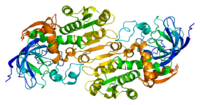
Photo from wikipedia
BackgroundYeast-based chemical production is an environmentally friendly alternative to petroleum-based production or processes that involve harsh chemicals. However, many potential alcohol biofuels, such as n-butanol, isobutanol and n-hexanol, are toxic… Click to show full abstract
BackgroundYeast-based chemical production is an environmentally friendly alternative to petroleum-based production or processes that involve harsh chemicals. However, many potential alcohol biofuels, such as n-butanol, isobutanol and n-hexanol, are toxic to production organisms, lowering the efficiency and cost-effectiveness of these processes. We set out to improve the tolerance of Saccharomyces cerevisiae toward these alcohols.ResultsWe evolved the laboratory strain of S. cerevisiae BY4741 to be more tolerant toward n-hexanol and show that the mutations which confer tolerance occur in proteins of the translation initiation complex. We found that n-hexanol inhibits initiation of translation and evolved mutations in the α subunit of eIF2 and the γ subunit of its guanine exchange factor eIF2B rescue this inhibition. We further demonstrate that translation initiation is affected by other alcohols such as n-pentanol and n-heptanol, and that mutations in the eIF2 and eIF2B complexes greatly improve tolerance to these medium-chain alcohols.ConclusionsWe successfully generated S. cerevisiae strains that have improved tolerance toward medium-chain alcohols and have demonstrated that the causative mutations overcome inhibition of translation initiation by these alcohols.
Journal Title: Biotechnology for Biofuels
Year Published: 2018
Link to full text (if available)
Share on Social Media: Sign Up to like & get
recommendations!